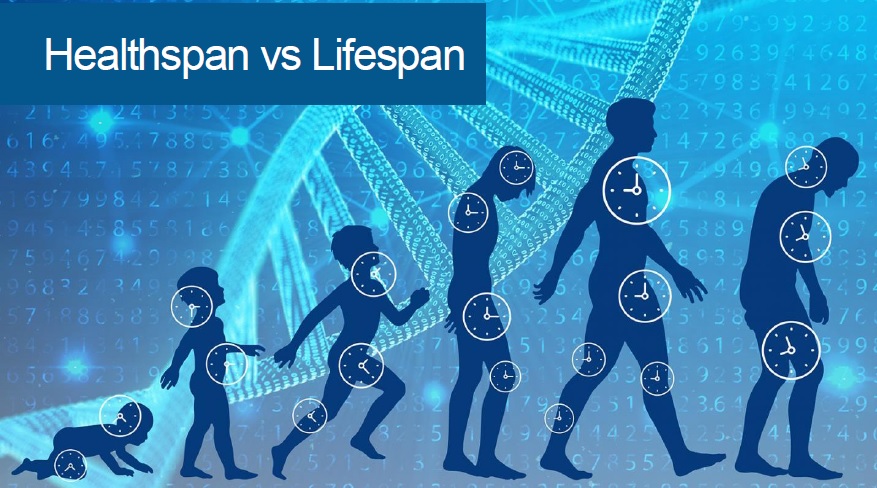Worldwide difference between healthspan and lifespan
• Healthspan: the length of time a person is healthy.
• Lifespan: the length of time a person lives.
• The United Nations reports the world’s lifespan is approximately 73 years.
• Healthspanis approximately 64 years.
• The estimated gap between living a healthy life and living with a chronic illness or disability is 9 years.1
What happens as we age?
There are many areas of our body’s functioning that decline with age. These include
- progressive loss of physiological integrity – strength, muscle mass, mobility
- age increases the risk for chronic disease and disorders
- diminished production of immune cells
- telomere shortening
- decreased methylation
- increased duration of exposure to environmental toxins
Is it possible to reverse our biological clock?
A recent study set out to determine if a 3-month nutrition, supplement and lifestyle intervention program can alter DNA methylation and biological age. DNA methylation is a robust marker of biological age and age-related conditions.
The study cohort included a total of 300 adults including men and women (non-pregnant or breastfeeding). Initial study timeframe was three months, however, there are several participants who continued for six months.
Results show that the epigenetic methylation mechanism can be changed by diet, sleep, exercise, and lifestyle. Ages of some participants improved by up to 15 years in three months.
Another often overlooked yet powerful mechanism involves parental impact on their children’s biological clock. The areas that influence foetal methylation and thus the child’s future health outcomes, relate to pre-conception preparation of both parents and what happens during pregnancy. The environment of the unborn child while in utero has a significant impact – factors include stress, trauma, maternal nutritional deficiencies and environmental toxins. These can change that child’s methylation and health outcomes increasing risk of developing obesity, metabolic disorders including diabetes and cardiovascular disease.
The health of male sperm also affect the future child’s health with smoking, poor diet and exposure to environmental toxins being the most significant parameters involved.
Can I reverse my biological clock?
Yes! There are functional biological tests available. It is recommended that you do the initial test and then follow-up within three to six months.
During that time, and preferably ongoing, there are definite dietary recommendations as well as lifestyle changes that may be required. The recommendations are not onerous and align with other information on this website. For example:
- eating a fresh, whole foods diet incorporating organic or spray-free produce
- organic/pasture raised meat, poultry and eggs, and wild-caught (not farmed) seafood
- consuming sufficient purified water daily
- limiting caffeine and alcohol
- reduced processed carbohydrates – getting most from vegetables, legumes, nuts, seeds and fruit
- avoid sugars and highly processed foods
- avoid plastic food and drink containers
- minimise chemical-laden household cleaners, fragrances, skin/personal care products
- aim to eat your last meal three hours before going to bed (no snacks)
If you would like further information, either regarding assessing your biological age or in preparing your body for pregnancy, contact True Medicine on 0468 774 633.
References: Study coordinator Dr Denise Furness, PhD BSc(Hons) RNutr
- GarmanyA, Yamada S, Terzic A. Longevity leap: mind the healthspangap. NPJ Regen Med. 2021

